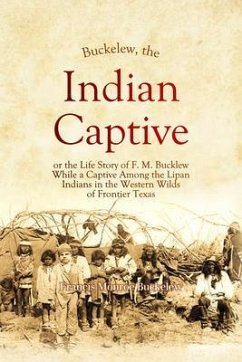"Frank tells of...their hunting methods, their raids, their encounters with their enemies the Kickapoos and his final escape near the Mexican border." -The Bakersfield Californian, Jan. 5, 1966.
"Buckelew became an involuntary guest of the Lipans...one of the few intimate accounts of their life in this period." - I Fought a Good Fight: A History of the Lipan Apaches (2013)
"Buckelew, captured at age 13 lived with the Lipan Apaches for 11 months, 1866-67...rejected the Indians' way of life." - The Captured: A True Story of Abduction by Indians (2007)
"Once Buckelew was brought to the main Lipan camp, he underwent the beating ritual." - The Light Gray People: An Ethno-History of the Lipan Apaches (2009)
How did Texas ranch-hand youth Francis Monroe Buckelew (1852-1930) come to be captured by the Lipan Apaches in 1866, enduring nearly a year's captivity at their Pecos River and Rio Grande camps before he was able to escape?
In 1866 Texas, while working on the Davenport Ranch and in company of a negro boy, Frank Buckelew was sent out to hunt for a lost ox bell that had dropped off somewhere on the range. The found something in a thicket that aroused their curiosity, and upon close investigation it proved to be an Indian under a blanket.
In recounting his introduction to the Indians at the village where they arrived after his capture, Mr. Bucklew, in his book, says:
"It was evident from the stir among the Indians at the village that something unusual was about to take place, as the old squaws, boys and girls, all held something in their hands, either quirts, sticks or clubs, and as I neared them, they began to form in line along the main road passing through the village. I knew that resistance would be useless, as there were hundreds of warriors standing near to subdue and punish any resistance. I walked forward, not knowing what fate awaited me...."
Although a personally painful experience for Buckelew, his personal narrative provides one of the few insights into the culture and life of the Lipan Apaches, including foods, cooking methods, various weapons, methods of warfare, and interactions with settlements in Texas and Mexico.
In introducing his book, Buckelew writes:
"Posterity fails to appreciate, indeed it seems difficult in the midst of modern complex civilization, where the strong arm of law bids defiance to the wholesale destruction of life and property, to rightly appreciate the noble sacrifice made by our fore-fathers, in driving back the cruel savage with his merciless tomahawk, and midnight ambush, facing the dangers from wild beasts and savage men, and holding with relentless grasp for the pleasure and profit of posterity that priceless boon, the 'Lone Star State.'"
"Buckelew became an involuntary guest of the Lipans...one of the few intimate accounts of their life in this period." - I Fought a Good Fight: A History of the Lipan Apaches (2013)
"Buckelew, captured at age 13 lived with the Lipan Apaches for 11 months, 1866-67...rejected the Indians' way of life." - The Captured: A True Story of Abduction by Indians (2007)
"Once Buckelew was brought to the main Lipan camp, he underwent the beating ritual." - The Light Gray People: An Ethno-History of the Lipan Apaches (2009)
How did Texas ranch-hand youth Francis Monroe Buckelew (1852-1930) come to be captured by the Lipan Apaches in 1866, enduring nearly a year's captivity at their Pecos River and Rio Grande camps before he was able to escape?
In 1866 Texas, while working on the Davenport Ranch and in company of a negro boy, Frank Buckelew was sent out to hunt for a lost ox bell that had dropped off somewhere on the range. The found something in a thicket that aroused their curiosity, and upon close investigation it proved to be an Indian under a blanket.
In recounting his introduction to the Indians at the village where they arrived after his capture, Mr. Bucklew, in his book, says:
"It was evident from the stir among the Indians at the village that something unusual was about to take place, as the old squaws, boys and girls, all held something in their hands, either quirts, sticks or clubs, and as I neared them, they began to form in line along the main road passing through the village. I knew that resistance would be useless, as there were hundreds of warriors standing near to subdue and punish any resistance. I walked forward, not knowing what fate awaited me...."
Although a personally painful experience for Buckelew, his personal narrative provides one of the few insights into the culture and life of the Lipan Apaches, including foods, cooking methods, various weapons, methods of warfare, and interactions with settlements in Texas and Mexico.
In introducing his book, Buckelew writes:
"Posterity fails to appreciate, indeed it seems difficult in the midst of modern complex civilization, where the strong arm of law bids defiance to the wholesale destruction of life and property, to rightly appreciate the noble sacrifice made by our fore-fathers, in driving back the cruel savage with his merciless tomahawk, and midnight ambush, facing the dangers from wild beasts and savage men, and holding with relentless grasp for the pleasure and profit of posterity that priceless boon, the 'Lone Star State.'"
Dieser Download kann aus rechtlichen Gründen nur mit Rechnungsadresse in A, D ausgeliefert werden.


